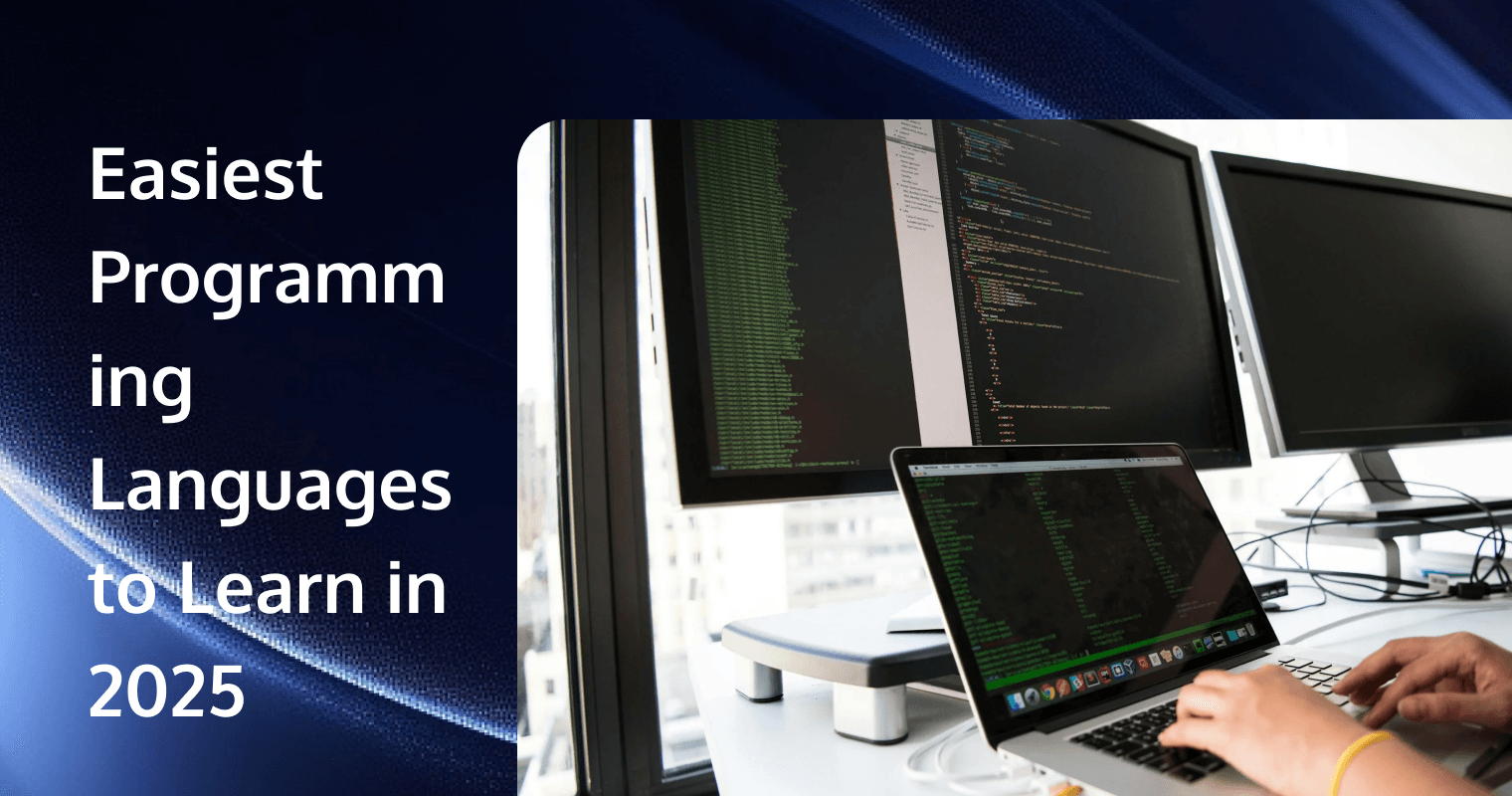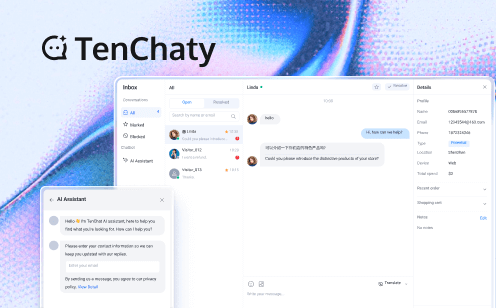 Thinking about learning to code but unsure where to start? You're not alone! With so many programming languages out there, it's easy to feel overwhelmed. The good news is that some languages are perfect for beginners—they're simple, fun, and easy to pick up.
Thinking about learning to code but unsure where to start? You're not alone! With so many programming languages out there, it's easy to feel overwhelmed. The good news is that some languages are perfect for beginners—they're simple, fun, and easy to pick up.
In this guide, we'll talk about how much time it might take to learn a beginner-friendly language, highlight the top five easiest programming language to learn in 2025, and share tips to help you choose the best fit for your goals.

Should You Learn to Code?
If you're wondering whether learning to code is worth it, the short answer is yes! Coding isn't just for engineers or computer scientists—it's a skill that can benefit everyone. Whether you want to switch to a tech career, enhance your current job with automation, start a side hustle, or simply challenge yourself with something new, coding opens doors to countless opportunities.
Think about all the apps, websites, and gadgets you use every day. Behind each of them is a set of instructions written by a programmer. By learning to code, you can become the one creating those instructions, solving problems, and building tools to make life easier for others (or yourself!).
The best part? You don't need to be a math whiz or a computer genius to get started. Many programming languages are designed with beginners in mind, making it easier than ever to take that first step. So, if you've been thinking about giving coding a shot, now's the perfect time to start!
How Long Does It Take to Learn a Beginner Programming Language?
A programming language is a way for you to communicate with computers, enabling you to create apps, websites, and games. It consists of a set of syntax rules and semantics used to write code that can be executed by the computer to perform specific tasks.
Choosing a beginner-friendly programming language is an important first step because it makes the learning process smoother and less intimidating. So, how long does it take to get the hang of one? On average, you can pick up the basics of most beginner languages in about 3 to 6 months. The exact time depends on factors like how much time you can dedicate each day, the language you choose, and your previous experience with technology.
If you spend even 1-2 hours a day practicing and working on small projects, you could write your first simple program in just a few days. Within a month, you might feel comfortable building small, functional projects like a calculator or a basic website.
While you might grasp the basics quickly, achieving mastery takes time. It requires consistent practice, hands-on experience with real-world projects, and the ability to develop effective problem-solving strategies. This ongoing learning process can take years, but it equips you to confidently apply your skills in real-life situations.
Top 5 Easiest Programming Languages to Learn in 2025
So, what is the easiest programming language to learn, exactly? Here are the top five options to help you get started on the right foot:
Python
Python is one of the most beginner-friendly programming languages, known for its simple and readable syntax. It feels almost like writing in plain English, which makes it a favorite for those new to coding.
Python is incredibly versatile, used in fields like web development, data analysis, machine learning, AI, and automation. It's also supported by a massive community, meaning help is always available through forums, tutorials, and documentation.
With Python, you can build everything from simple scripts to complex applications, and the wide range of libraries and tools makes it a practical choice for exploring various coding projects.
Why It Is Easy
- Readable Syntax: Python's syntax is simple and resembles plain English.
- Extensive Resources: Tutorials, forums, and guides make learning Python accessible to beginners.
- Immediate Results: Build small projects and see outcomes quickly for hands-on learning.
Ruby
Ruby is a beginner-friendly language known for its elegant and easy-to-read syntax. It's designed to prioritize simplicity and productivity, allowing you to focus on solving problems rather than getting bogged down by complex rules.
Ruby is widely used for building web applications, especially with the Ruby on Rails framework, which simplifies the process of creating websites. It's also supported by an active and welcoming community, making it easier for newcomers to find help.
Why It Is Easy
- Human-Like Syntax: Its syntax reads almost like natural language, making it intuitive for beginners.
- Error Tolerance: It offers a forgiving environment where minor mistakes don't derail learning progress.
- Rich Resources: A strong community, extensive tutorials, and libraries make support readily available.
- Quick Results: Ruby emphasizes simplicity, enabling learners to build functional applications with minimal effort.
- Framework Efficiency: Ruby on Rails simplifies complex web development tasks, streamlining the learning curve.
HTML
HTML (Hypertext Markup Language) is the backbone of web content, used for creating and structuring webpages. It defines the elements of a webpage, such as headings, paragraphs, and links.
Although HTML is not a programming language in the strictest sense, it is an essential skill for anyone aspiring to work in web development. HTML can be learned through numerous online resources, including tutorials, courses, and coding exercises, all of which provide the foundation for understanding web design.
Why It Is Easy
- Simple Structure: HTML focuses on structure, not complex logic, making it easy to understand.
- Beginner-Friendly Tags: Straightforward tags define webpage sections, requiring no prior experience.
- Low Learning Curve: You can quickly create basic web pages to build confidence and foundational skills.
- Web Development Foundation: It prepares you for more advanced languages like CSS and JavaScript.
PHP
PHP is a server-side scripting language primarily used in web development. It's the engine behind some of the most popular content management systems, such as WordPress, and powers a significant portion of the web.
PHP is a great language to learn for those interested in building dynamic websites and web applications. Beginners can begin learning PHP through free resources, such as the PHP manual and various online tutorials, which provide a step-by-step guide to understanding the language.
Why It Is Easy
- Forgiving Syntax: PHP is beginner-friendly, especially for those familiar with HTML and CSS.
- Rapid Prototyping: It enables quick creation of functional web applications with minimal complexity.
- Extensive Resources: It offers vast documentation and community support for solving coding challenges.
- Web Development Focus: It is deal for beginners looking to quickly dive into building websites.
JavaScript
JavaScript is essential for creating dynamic and interactive websites, making it a must-learn language for aspiring web developers. It's used on both the front-end (the part users see) and back-end (server-side) of websites, especially when paired with frameworks like React or Node.js.
JavaScript has a forgiving and flexible syntax, which makes it approachable for beginners. Beyond websites, you can use JavaScript for creating web applications, games, and mobile apps. Its universal presence on the web ensures that learning JavaScript opens up a wide range of opportunities, while its active community offers extensive resources for support.
Why It Is Easy
- Straightforward Syntax: JavaScript's syntax is beginner-friendly, despite being more intricate than Python's.
- Immediate Feedback: Integration with browsers lets you instantly see and adjust your code's output.
- High Versatility: You can start with simple scripts and progress to complex applications seamlessly.
- Gradual Learning Curve: Designed to keep the process manageable, it is even for complete beginners.
Factors to Consider When Choosing a Programming Language
Choosing the right programming language depends on several key factors. Each language serves specific purposes and caters to different skill levels and goals. Here's what to consider when making your choice:
- Your Goals: Think about what you want to achieve with coding. Are you interested in building websites, creating apps, analyzing data, or designing games? Different languages are suited for different purposes. For example, HTML and JavaScript are great for web development, while Python is versatile and widely used for data science, automation, and more.
- Ease of Learning: As a beginner, you'll want to choose a language with simple syntax and plenty of learning resources. Languages like Python and Ruby are known for being beginner-friendly, which means you can start writing code and seeing results faster.
- Community and Resources: Having access to a strong community and plenty of tutorials, forums, and documentation can make your learning journey much smoother. Popular languages like Python, JavaScript, and HTML have huge communities, so you're never far from help when you hit a snag.
- Project Requirements: If you already have a specific project in mind, that can guide your choice. For example, if you want to create a mobile app, you might lean toward Swift for iOS or Kotlin for Android. For simple web pages, HTML and CSS are essential starting points.
- Future Opportunities: It's worth considering how your chosen language aligns with future career opportunities. Some languages, like Python and JavaScript, are in high demand across various industries, while others might be more niche. Researching job trends can help you make a choice that benefits your long-term goals.
Once you've grasped the basics and feel ready to take on real-world practices, tools like the Tencent RTC SDK can help you bring your projects to life. With Tencent RTC SDK, you can quickly develop low-latency, high-quality interactive services like voice calling, video calling, and interactive live streaming.
Whether you're creating a broadcast streaming platform or a fully customizable communication app, Tencent RTC SDK provides flexible APIs and tools to empower every aspect of your application. Its optimized global deployment, cross-platform support, and GDPR compliance make it ideal for building reliable, interactive experiences for global audiences.
Conclusion
To wrap up, choosing the easiest programming language to learn, from Python and HTML to JavaScript, is a personal decision influenced by your goals, interests, and how you plan to use your coding skills. Whether you're drawn to web development, data analysis, or app creation, there's a beginner-friendly language to suit your needs. Remember, it's not just about the language—it's about taking that first step and sticking with it. With the right mindset and a little patience, you'll be coding in no time and opening up exciting new opportunities for yourself.
FAQs
What is the 1 easiest language to learn?
Python is widely considered the easiest language to learn, thanks to its readable syntax and versatility across various fields, including web development, data analysis, and artificial intelligence.
Is Python easier than Java?
Yes, Python is generally regarded as easier than Java, particularly for beginners. Python's syntax is more intuitive and readable, which makes it a better choice for those just starting their programming journey.
Which programming language is fastest to learn?
The fastest programming language to learn depends on your goals and background. If you're new to programming, Python is often the best choice because of its simple syntax and wide range of applications. For web development, HTML and JavaScript are beginner-friendly and quick to pick up. If you're interested in app development, Swift (for iOS) and Kotlin (for Android) are also relatively easy to learn.
Is C++ actually faster than Python?
Yes, C++ is generally faster than Python in terms of execution speed due to its lower-level nature. However, Python is easier to write and offers faster development cycles, making it more efficient for certain applications.
If you have any questions or need assistance online, our support team is always ready to help. Please feel free to Contact us or join us on Telegram or Discord.


